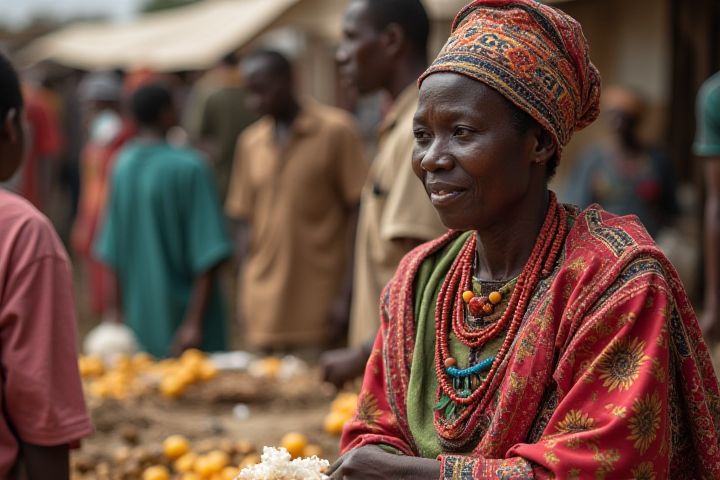
Nigeria's traditional markets, characterized by vibrant colors and diverse products, serve as vital economic hubs across the country. Each market is a melting pot of local crafts, fresh produce, textiles, and spices, reflecting the rich cultural heritage of various Nigerian ethnic groups. Popular markets like Balogun Market in Lagos and Ariaria International Market in Aba draw both local vendors and international buyers, fostering trade and entrepreneurship. Engaging with these markets allows you to experience authentic Nigerian culture, including traditional bargaining practices and culinary delights. The bustling atmosphere and the scent of street food further enhance the sensory experience, making traditional markets a must-visit for both locals and tourists.
Variety of goods offered
Traditional markets in Nigeria showcase a vibrant array of goods, including fresh produce, textiles, crafts, and traditional foods, reflecting the rich cultural heritage of the country. Each market serves as a hub for local farmers and artisans, providing a platform for them to showcase their products and sustain their livelihoods. In cities like Lagos and Kano, you can explore bustling stalls filled with colorful spices, handmade jewelry, and intricate woodwork, all highlighting the unique skills of Nigerian craftsmen. These markets not only offer a diverse shopping experience but also foster community engagement and preserve cultural traditions.
Negotiation and haggling
Traditional markets in Nigeria play a vital role in the local economy, showcasing rich cultural heritage and vibrant social interactions. Merchants and buyers engage in negotiation and haggling, promoting not only economic activity but also community bonding. These markets feature a diverse array of products, including fresh produce, textiles, handicrafts, and traditional foods, reflecting Nigeria's rich biodiversity and craftsmanship. By participating in these markets, you can experience the unique atmosphere and the art of bargaining, which remains a cherished aspect of the Nigerian trading culture.
Vibrant atmosphere and bustling crowds
Traditional markets in Nigeria exude a vibrant atmosphere, filled with the sounds of lively bartering and the enticing aromas of various local cuisines. Each market showcases an array of colorful stalls offering fresh produce, handcrafted goods, and traditional textiles, reflecting the rich cultural heritage of Nigeria. The bustling crowds create a unique energy, attracting both locals and tourists eager to experience authentic Nigerian life. As you explore, you'll discover the essence of community and commerce woven together in a tapestry of sights, sounds, and flavors, making these markets a must-visit destination.
Local food and spices availability
Traditional markets in Nigeria serve as vibrant hubs for local food and spices, showcasing the rich culinary heritage of the region. These markets offer a diverse array of fresh produce, including leafy greens, root vegetables, and an assortment of spices that are crucial to Nigerian cuisine. Vendors, often local farmers and artisans, emphasize organic practices, ensuring that you get quality ingredients that burst with flavor. Their communal atmosphere fosters connections among buyers and sellers, preserving cultural traditions while promoting the consumption of locally-sourced food.
Cultural and social hubs
Traditional markets in Nigeria serve as vibrant cultural and social hubs, reflecting the rich diversity of local communities. These markets, often bustling with activity, offer an array of goods including fresh produce, handmade crafts, and textiles, showcasing traditional craftsmanship. Engaging with local vendors provides you the opportunity to experience Nigeria's heritage and culinary delights firsthand. Furthermore, these markets foster community connections, acting as essential spaces for social interactions and cultural exchanges among various ethnic groups.
Informal economic activities
Traditional markets in Nigeria serve as vital hubs for informal economic activities, providing livelihoods for a significant portion of the population. These markets facilitate the exchange of various goods, including food products, textiles, and crafts, often sourced from local producers and artisans. Characterized by vibrant interactions, they foster community networks and social connections among vendors and customers. By minimizing barriers to entry, these markets empower small-scale entrepreneurs and support the overall economy.
Diverse artisan crafts
Traditional markets in Nigeria showcase a vibrant array of artisan crafts, reflecting the rich cultural heritage of various ethnic groups. Handwoven textiles, intricately carved wooden sculptures, and colorful beadwork are just a few examples of the unique products available. Each item carries a story, often rooted in local traditions and techniques passed down through generations. Visiting these markets allows you to support local artisans while experiencing the dynamic atmosphere and creativity of Nigeria's craft scene.
Market-specific days of operation
Traditional markets in Nigeria operate on specific days that vary by region and community, creating a vibrant calendar of commerce. For instance, the popular Oja Oba Market in Akure is bustling on Tuesdays, while the Kano City Market thrives on Wednesdays. These designated market days not only foster local economic activity but also serve as social events where vendors and buyers engage, exchange goods, and strengthen community ties. By understanding these market schedules, you can easily navigate the unique cultural and economic landscapes of different Nigerian cities.
Street vendors and hawkers
Traditional markets in Nigeria are vibrant hubs where street vendors and hawkers play a crucial role in the local economy. These markets showcase an eclectic mix of goods, from fresh produce to handmade crafts, reflecting the rich cultural diversity of the region. You can find unique items ranging from textiles to spices, each with its own story and significance. The dynamic interactions between vendors and customers create an engaging shopping experience, fostering community ties and supporting local livelihoods.
Community-driven commerce
Traditional markets in Nigeria serve as vital hubs for community-driven commerce, fostering local economic growth and supporting small businesses. These vibrant marketplaces offer a diverse array of goods, from fresh produce and textiles to handcrafted items, reflecting the rich cultural heritage of the region. Engaging directly with vendors, you experience the dynamic interchanges that build strong community bonds and trust. The atmosphere is lively and colorful, with vendors often negotiating prices and sharing stories, making shopping a culturally immersive experience.
